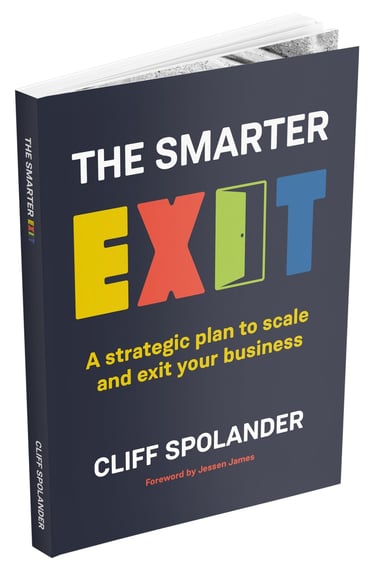Limited Time Offer! Accounts Health Checkup only £95
The Smarter Exit by Cliff Spolander
BOOK REVIEWS
Sam Jackson
11/30/20233 min read


Ah, the age-old question: how does one gracefully bid adieu to their business without feeling like they’ve just set fire to decades of hard work? Enter The Smarter Exit, Cliff Spolander’s no-nonsense guide to getting out while the getting’s good. And, if you think exit planning is something you do the week before handing over the keys, well, dear reader, you might want to pour yourself a strong cup of tea (or something stronger) before diving in.
The Premise: Why Every Business Owner Needs an Exit Plan (Even If You Swear You’ll Never Retire)
Spolander starts with a blunt truth that many entrepreneurs seem to avoid like a VAT bill: you will exit your business someday. Whether it’s in a celebratory champagne toast or via a fire sale when disaster strikes is entirely up to you. His argument? The smart money is on being exit-ready well before you plan to leave. After all, as he points out, 50% of business owners will be forced to exit due to life’s less-than-welcome surprises (illness, financial distress, or, heaven forbid, death). The alternative? Scrambling to sell at a fraction of your business’s potential value, like an eBay seller desperately trying to offload a used sofa with a suspicious stain.
Spolander, who’s had the pleasure (or horror) of examining over a thousand businesses for sale, shares war stories of entrepreneurs who left it too late. Take Bill, the welding maestro who built a million-pound business but forgot one crucial detail: to make it saleable. By the time he was ready to retire, the business was so dependent on him that buyers ran for the hills. Bill’s dream of cashing out and retiring to the coast? Dashed, as he worked himself into the grave. A bit bleak, but an effective wake-up call.
The Process: How Not to Ruin Your Own Exit
The book is neatly structured around Spolander’s Business By Design methodology—Clarity, Control, Consistency, and Completion. Essentially, it’s a five-year plan to get your business running smoothly without you so that, when the time comes, buyers aren’t terrified at the prospect of running it without your omnipresence.
Clarity: Know where you stand. Spolander introduces a “value assessment” tool that helps business owners figure out exactly how much (or how little) their business is actually worth, minus the rose-tinted glasses. Spoiler: it’s often not as much as you think.
Control: Systematize, delegate, and remove yourself from the centre of everything. If you’re still the chief coffee-maker, problem-solver, and salesperson, you don’t own a business—you own a job.
Consistency: Keep making improvements over time. No last-minute crash diets; think sustainable, well-documented growth.
Completion: The actual exit, which ideally should be a seamless, lucrative process rather than a panic-induced fire sale.
He also tackles one of the most painful realities for sellers: your business is only worth what someone is willing to pay for it. You might believe it’s a golden goose, but buyers are looking at the numbers, the risks, and, crucially, whether it falls apart without you. His examples of deals falling through due to owner-centric businesses are enough to make even the most stubborn entrepreneur reconsider their “no one can do it like me” mindset.
Why It’s Worth Reading (Even If You Swear You’ll Never Sell)
Even if you have zero intention of selling, The Smarter Exit is essentially a masterclass in good business hygiene. A business that is exit-ready is one that is efficient, profitable, and well-structured—essentially, a business you wouldn’t mind owning for life. Spolander’s approach is less about “sell now” and more about “have options”—because the best exits happen when you choose to leave, not when circumstances force you out.
Final Verdict
For any business owner who doesn’t fancy the idea of working until their last breath, The Smarter Exit is essential reading. Spolander writes with the kind of clarity that makes even the most complex financial concepts digestible, and his anecdotes—often tragic, sometimes darkly humorous—serve as both warning and inspiration.
If nothing else, read this book to avoid becoming the next Bill. Because, as Spolander rightly points out, the worst exit strategy is no exit strategy at all.
Address
Mainyard Studios, 679 High Road, London E10 6RA
Contacts
© 2025 Control Grow Financial Ltd. All rights reserved.


Build your business with confidence.
